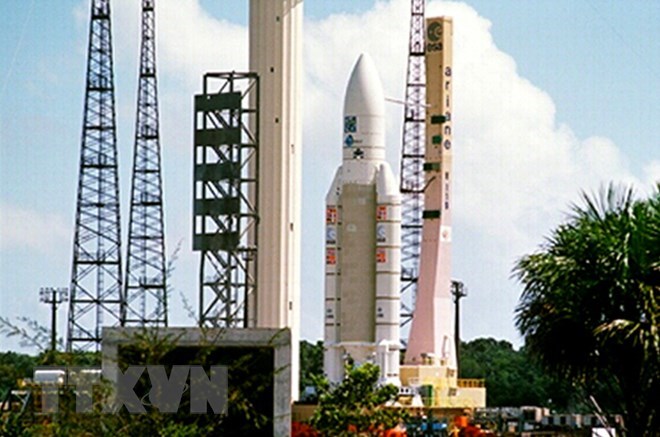
Ariane 5 rocket with Vinasat-2 on board on its way to the launch pad in Guiana Space Centre in 2013 (Photo: VNA)
In 2006, then Prime Minister Phan Van Khai approved the strategy for Research and Application on Space Technology for Vietnam’s socio-economic development.
Almost two years later, Vietnam Post and Telecommunications Group signed an agreement with Lockheed Martin of the US on the creation of the Vinasat-1 satellite. The launch of Vinasat-1 in 2008 marked a milestone of the country’s space industry.
Along with economic benefits, it affirmed Vietnam’s sovereignty in space and its position by becoming the world’s 93rd country and the sixth nation in Southeast Asia to have its own satellite.
Vietnam launched the Vinasat-2 satellite in 2012, and the remote-sensing VN Redsat-1 and micro satellite “PicoDragon”, which was made in Vietnam with the support of Japan, in 2013.
A bigger satellite, “Micro Dragon” is expected to go into space in 2018 while another satellite project called “Nano Dragon” is being carried out in 2017-2019.
MicroDragon aims to observe coastal areas of Vietnam to evaluate water quality, marine food resources and follow up on changes in coastal areas to inform the fish breeding sector.
Under the satellite development roadmap, Vietnam will also launch the LOTUSat-1 and LOTUSat-2 satellites, which were designed by Japanese experts and will be assembled and piloted by Vietnamese engineers, by 2019 and 2020, respectively. These are expected to provide data to improve the efficiency of natural resource management and mitigating damage caused by natural disasters.
The country has paid heed to building and upgrading the infrastructure for the space industry. The Hanoi-based Vietnam Space Centre under the Vietnam National Satellite Centre (VNSC) is a significant project which will be responsible for research and management of small satellites observing the Earth and Vietnam.
The construction of a space museum at the Hoa Lac Hi-tech Industrial Park is almost ready for operation this year. The VNSC has also completed the building of an astronomical observatory Nha Trang, central Khanh Hoa province.
Regarding personnel, since September 2013, the VNSC has sent 36 engineers to universities in Japan to learn about satellite technologies, while signing educational deals on space science with three Vietnamese universities, including the Hanoi’s University of Science and Technology, University of Engineering and Technology under the Vietnam National University - Hanoi and the Ho Chi Minh International University.
Vietnam has boosted cooperation with many aeronautical agencies, namely the Japan Aerospace Exploration Agency, NASA of the US and aeronautical institutes of France and Russia./.
VNA
 Da Nang invests over 200 billion VND in semiconductor chip design, AI development
Da Nang invests over 200 billion VND in semiconductor chip design, AI development



